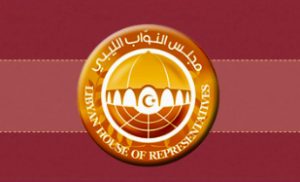By Sami Zaptia.

London, 29 December 2021:
The Presidency of the House of Representatives (HoR) held a meeting yesterday with the HoR’s Road Map Committee at the HoR’s Tobruk headquarters.
According to the HoR’s Official Spokesperson, Abdalla Belheeq, the meeting dealt with the mechanisms of the Committee’s work in developing a road map for Libya’s next political phase in order to achieve the national entitlement of holding elections according to the will of the Libyan people.
This, Belheeg added, will be done through the current givens of the electoral process and by communicating with all concerned parties and parties.
Road Map Committee holds first official meeting
Separately, yesterday, the HoR Road Map Committee issued what it called its first press briefing in which it announced that it had held its first meeting at the HoR’s Tobruk headquarters.
The meeting was held in the presence of Acting HoR Speaker Fawzi Al-Nuweri and his Deputy Ehmid Houma.
The Road Map Committee clarified that its meeting was devoted to discussing its work mechanism to accomplish its assigned tasks on time.
The Committee also said that it intends to communicate with all Libyan parties to expand the base of participation and restore the Libyan cause to the Libyans by finding Libyan solutions to achieve presidential and parliamentary elections and to exit the successive transitional stages.
Analysis
HoR’s Road Map Committee
It will be recalled that following the announcement by Libya’s High National Elections Commission (HNEC) on 22 December that the country’s elections planned for 24 December 2021 would not go ahead, the HoR announced on the same day decision (13/2021) to form a 10-member committee to work on preparing a proposal for a post-24 December 2021 political road map.
The HoR had demanded the committee submit its report to the office of the Presidency within a week to present it to the floor of the House during its next session.
A week has passed and the HoR held sessions on 27 and 28 December, but the new Road Map Committee did not submit a report as it was only on the 27 December that the full House received the reports on the electoral process delivered to the HoR by its HoR Election Committee, the High National Elections Commission (HNEC) report on the failure to hold the elections and the secret reports delivered to the HoR by the Interior Ministry and Intelligence Service.
It is also now unclear when the HoR Road Map Committee will present its report to the HoR as one of the HoR’s decisions (decision 4/5) during its 27 December session was to
- ‘‘The HoR decided to summon the President and members of the High National Elections Commission (HNEC) to the next session to hear from them about all the obstacles to the electoral process contained in their report.’’
summon the HNEC board and its head Emad Sayeh in its next session to question them about the postponement of the elections and the details of their report. As the HoR generally only meets on Mondays and Tuesdays, this is now likely to be on Monday 3 and Tuesday 4 January.
When will the Road Map Committee report?
Given that, it is less likely to think that the Road Map Committee would want to present its report on the new political Road Map for Libya regarding preparing and setting in motion a process for holding the elections before hearing the outcomes of the questioning session of HNEC and its head Emad Sayeh.
In that case, and at best, even if it kept to its prescribed 7 days deadline, the Road Map Committee is unlikely to present its report to the House floor before Monday 10 and Tuesday 11 January.
Are elections likely on the HNEC suggested date of 24 January 2022?
This optimistic timeline would leave only 12 days until elections are held on the HNEC suggested 24 January 2022 date. This would not leave even 30 days of electioneering for candidates.
However, this is a fantasy timeline as the legal problems of the election law and the realms of authority and dynamics between HNEC and the judiciary and the HoR mean that it is very likely that the process will take months rather than 24 January 2022.
Without Ageela Saleh as Speaker, is the HoR more conciliatory with the HSC?
It is notable that the HoR Road Map Committee stated that ‘‘it intends to communicate with all Libyan parties to expand the base of participation and restore the Libyan cause to the Libyans by finding Libyan solutions to achieve presidential and parliamentary elections and to exit the successive transitional stages.’’
It is clear that Libyans have failed miserably since 2011 to find inclusive political consensus on major issues such as the constitution and elections. They have failed to find Libyan solutions and have opened themselves up to international mediation and political and military interference through several international conferences and wars.
It is too early to draw any definitive conclusions regarding the real intention of the HoR led by Acting Speaker Nuwairi, but there are early signs of a new dynamics. Nuwairi seems less dictatorial than Ageela Saleh. There are signs that he might put out an olive branch to the High State Council (HSC).
It will be recalled that the breakdown of the positive dynamic between the HSC and Ageela Saleh had very much contributed to the very delayed issuing of the poor election law. The HoR and HSC had gone back and forth in their overseas negotiating over the election law. The HSC had insisted on agreeing on the constitution by putting it to a referendum before holding elections.
Ageela Saleh wanted to – and did – go ahead to elections without a referendum on a constitution he suspected would either be rejected by the public or the courts. He had acted unilaterally by ‘‘passing’’ the 24 December 2021 election law without consulting the HSC. He had even bypassed the HoR floor by presenting the law to HNEC directly from its Committee stage.
This analysis assumes that Nuwairi is relatively free from Ageela Saleh’s background influence and is able to navigate a more conciliatory course.
Will the HoR and HSC allow elections to take place?
It is unclear if a more positive dynamic between the HoR and HSC will lead to the holding of Libyan elections. Critics, it will be recalled, accuse both the HoR and HSC of postering on the holding of elections. They accuse both of wanting to postpone elections indefinitely to maintain the political status quo. They are accused of putting their highly paid jobs above the political stability of Libya.
Indeed, critics accuse Saleh of deviously and premeditatively creating a defective election law and counting on it to fail down the line.
.
HoR unable to reach agreement on progress towards another election date | (libyaherald.com)
HoR creates committee for a new post-24 December 2021 roadmap | (libyaherald.com)
UNSMIL warns that political tensions should be resolved through dialogue | (libyaherald.com)








